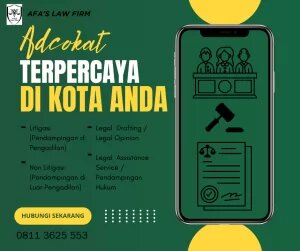Best Housing, Construction & Development Lawyers in Jakarta
Share your needs with us, get contacted by law firms.
Free. Takes 2 min.
Free Guide to Hiring a Real Estate Lawyer
List of the best lawyers in Jakarta, Indonesia
About Housing, Construction & Development Law in Jakarta, Indonesia
Housing, Construction & Development law in Jakarta, Indonesia governs the regulations and legal requirements related to the development, construction, ownership, and management of properties in the city. These laws aim to ensure proper planning, construction standards, and compliance with zoning regulations to promote safe and sustainable development in Jakarta.
Why You May Need a Lawyer
There are several situations where seeking legal advice from a lawyer in the field of Housing, Construction & Development in Jakarta may be necessary:
- Resolving property disputes or conflicts with tenants, landlords, contractors, or developers.
- Navigating the complex process of obtaining permits and licenses for construction or development projects.
- Understanding and negotiating construction contracts, leases, or sale agreements.
- Guidance on compliance with local building codes, zoning regulations, and other legal requirements.
- Seeking legal representation in court for issues related to housing, construction, or development.
Local Laws Overview
When it comes to Housing, Construction & Development in Jakarta, it is important to be aware of the following key aspects of local laws:
- Building Regulations: Jakarta has specific building codes and regulations that dictate the standards for construction, including safety, design, and environmental considerations.
- Land Use and Zoning: The city has zoning regulations that determine how land can be used, specifying areas for residential, commercial, industrial, and other purposes.
- Permits and Licenses: Various permits and licenses, such as building permits and occupancy permits, are required for construction and property development projects in Jakarta.
- Tenant and Landlord Laws: Specific laws exist to protect the rights of both tenants and landlords, covering areas such as eviction processes, rent increases, and maintenance responsibilities.
- Contractual Obligations: Any agreements related to housing, construction, or development should be carefully reviewed and negotiated to ensure they comply with local laws and protect the interests of the parties involved.
Frequently Asked Questions
Q1: Can I start a construction project without obtaining permits in Jakarta?
No, it is illegal to start a construction project without the necessary permits in Jakarta. You must obtain the required permits from the relevant authorities before commencing any construction or development activities.
Q2: How can I resolve a dispute with my landlord/tenant in Jakarta?
If you have a dispute with your landlord or tenant in Jakarta, it is recommended to try resolving it through negotiation or mediation first. If this fails, you may need to seek legal assistance from a lawyer who specializes in housing and tenancy laws.
Q3: What are the penalties for violating building codes in Jakarta?
The penalties for violating building codes in Jakarta can vary depending on the specific circumstances. They may include fines, suspension of construction activities, or even demolition of the non-compliant structures. It is essential to comply with all applicable building regulations to avoid legal consequences.
Q4: What is the role of a notary in property transactions in Jakarta?
In Jakarta, a notary plays a crucial role in property transactions. They are responsible for ensuring the validity and legality of the transaction, including verifying the identities of the parties involved, drafting and notarizing the necessary documents, and registering the property transfer with the relevant authorities.
Q5: How can I verify if a construction company is licensed in Jakarta?
You can verify the licensing status of a construction company in Jakarta by checking with the Jakarta Construction Service Development Board. They maintain a registry of licensed construction companies, and you can contact them or visit their website for the most up-to-date information.
Additional Resources
For further information and assistance in the field of Housing, Construction & Development in Jakarta, Indonesia, consider reaching out to the following resources:
- Jakarta Construction Service Development Board: Official government body responsible for regulating and licensing construction activities in Jakarta.
- Jakarta Legal Aid Institute: Provides free legal aid and advice to individuals who cannot afford legal representation.
- Association of Indonesian Construction Companies: A professional association that represents and supports construction companies in Indonesia.
Next Steps
If you require legal assistance regarding Housing, Construction & Development in Jakarta, Indonesia, here are the suggested steps to follow:
- Assess the specific nature of your legal issue or concern.
- Identify potential lawyers or law firms specializing in Housing, Construction & Development law.
- Arrange a consultation with a lawyer to discuss your case and evaluate their expertise.
- Provide all necessary documentation and information to your chosen lawyer.
- Follow the legal advice provided and maintain open communication with your lawyer throughout the process.
- Stay informed about the progress of your case and cooperate with your lawyer to achieve the best possible outcome.
Lawzana helps you find the best lawyers and law firms in Jakarta through a curated and pre-screened list of qualified legal professionals. Our platform offers rankings and detailed profiles of attorneys and law firms, allowing you to compare based on practice areas, including Housing, Construction & Development, experience, and client feedback.
Each profile includes a description of the firm's areas of practice, client reviews, team members and partners, year of establishment, spoken languages, office locations, contact information, social media presence, and any published articles or resources. Most firms on our platform speak English and are experienced in both local and international legal matters.
Get a quote from top-rated law firms in Jakarta, Indonesia — quickly, securely, and without unnecessary hassle.
Disclaimer:
The information provided on this page is for general informational purposes only and does not constitute legal advice. While we strive to ensure the accuracy and relevance of the content, legal information may change over time, and interpretations of the law can vary. You should always consult with a qualified legal professional for advice specific to your situation.
We disclaim all liability for actions taken or not taken based on the content of this page. If you believe any information is incorrect or outdated, please contact us, and we will review and update it where appropriate.
















